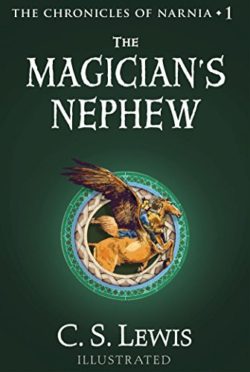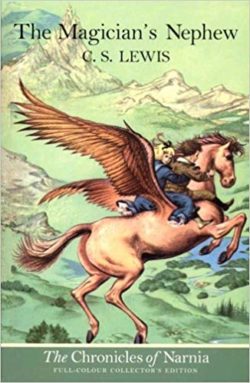 by C.S. Lewis
by C.S. Lewis
Conditional Recommendation: When Digory and Polly are tricked into another world and return with a witch, they try to set things right but accidentally end up in a new land where they witness Aslan creating Narnia.
Genre: Fantasy, Christian Allegory
I don’t think any other writer could end his children’s book with, “But she was a dem fine woman, sir, a dem fine woman,” and pull it off like C.S. Lewis. I’m sure you’ve heard of Narnia and The Lion, the Witch and the Wardrobe but do you know how it all began? This book reveals the origin story—how the land of Narnia, the lamppost, the witch, and the wardrobe all came to be.
I read The Lion, the Witch and the Wardrobe before The Magician’s Nephew and I liked learning the back story of characters and places I was already familiar with; for this reason, it’s my personal recommendation to read this book sometime after reading The Lion, the Witch and the Wardrobe.
When Digory and Polly are tricked by Digory’s peculiar Uncle Andrew into becoming part of a magical experiment, they set off on the adventure of a lifetime. What happens to the children when they touch Uncle Andrew’s magic rings is far beyond anything even the old magician could have imagined. Hurtled in the Wood between the Worlds, the children soon find that they can enter many worlds through the mysterious pools there. In one world they encounter the evil Queen Jadis, who wreaks havoc in the streets of London when she accidentally brought back with them. When they finally manage to pull her out of London, unintentionally taking along Uncle Andrew and a coachman with his horse, they find themselves in what will come to be known as the land of Narnia.
This book is categorized as fantasy/Christian allegory and rightly so for it contains many truths of Christianity tucked away amidst the fantasy. I especially enjoy the depiction of Aslan as immensely powerful yet exceptionally compassionate and kind. It’s a wonderful portrayal of who Jesus Christ is to us. For example, this scene between Aslan and Digory warms my heart and brings tears to my eyes:
“‘But please, please—won’t you—can’t you give me something that will cure Mother?’ Up till then he had been looking at the Lion’s great feet and the huge claws on them; now, in his despair, he looked up at its face. What he saw surprised him as much as anything in his whole life. For the tawny face was bent down near his own and (wonder of wonders) great shining tears stood in the Lion’s eyes. They were such big, bright tears compared with Digory’s own that for a moment he felt as if the Lion must really be sorrier about his Mother than he was himself.”
Isn’t that wonderful? When we face loss and grief or trials that seem bigger than we can bear, isn’t it the compassionate comforts of Jesus that give us peace and hope? Jesus, who wept when Lazarus died; Jesus, who cared for his mother despite his own suffering on the cross; Jesus, who sacrificed Himself so that we all may have life—He is compassionate toward us and C.S. Lewis accurately and wonderfully captures this attribute in Aslan. This is the kind of goodness and truth tucked between the pages of this book—if you’re looking you’ll find them.
The Magician’s Nephew rightly identifies good as good and evil as evil. It makes a story so much more enjoyable when evil and sin aren’t portrayed as good and right! Lying—in the way of leaving out the whole truth—isn’t tolerated by Aslan and characters such as Digory must come completely clean with the whole truth rather than just the pieces that shift the blame or put them in a better light. Honor by way of keeping your promises is upheld as good and right and taking what isn’t yours to take—stealing—is also identified and portrayed as wrong. I like that C.S. Lewis presents scenarios where lines can be blurry and yet makes a clear distinction between right and wrong.
There’s a lot of goodness that could be unpacked in this book—I haven’t even discussed the scenarios of deception and temptation, truths of human nature, and the struggle to choose what’s right over what you want most; but, I’ll leave it to you to find and enjoy the rest. This book would be a great book for discussion and family reading!
I’ve made this a conditional recommendation for a small reason and one easily skipped over if reading aloud, but I wanted to bring it to attention since this book is considered Christian. When Digory, Polly, Uncle Andrew, Jadis, the coachman and his horse arrive in Narnia confused about where they are and what’s going on, the Cabby says, “…And if we’re dead—which I don’t deny it might be—well, you got to remember the worst things ‘appen at sea and a chap’s got to die sometime. And there ain’t nothing to be afraid of if a chap’s led a decent life.” This may lead one to think that living a good life means when a person dies they’ll go to heaven. According to the Bible, this is simply not true. This issue is compounded when Aslan, who operates as a Jesus Christ figure in this series, calls the Cabby “son” and claims to have known him a long time. It very subtly ties this idea of living a good life to being a child of God and going to heaven. It’s unfortunate and subtle, but there it is.
C.S. Lewis has a way of telling a story that makes the experience magical and highly enjoyable. His descriptions are humorous and reveal his astute observations of human nature and while his word choices are from a time past, the meaning is no lesser for it. In fact, I think his particular use of language allows the storytelling to wrap the reader more firmly in the wonder of the story.
Digory, the magician’s nephew, is memorable because of his good friendship to Polly and his love for his dying mother. These two traits define him and come to play a part in several junctions of the story. He’s not perfect, by any means, but he is a character who knows what’s right, listens to the good authorities over him and makes choices with those authorities in mind even if they aren’t present. This story is especially delightful because Digory grows up to be the old Professor that Peter, Susan, Edmund and Lucy come to stay with and begin their adventures in Narnia.
Even though it ends with Jadis on the loose and her reign of winter still to come, the story ends with great joy and hope because of Aslan’s kindness and compassion toward Digory and his dying mother. Please go enjoy it for yourself! C.S. Lewis writes a tidy ending by tying up all the loose ends, even going so far as explaining how pieces of this book come into the next books. The Magician’s Nephew is definitely a prequel to the rest of the series even though the ending isn’t a suspenseful cliffhanger—it’s more of an invitation to carry on and enjoy the rest of the books.
I think Narnia will always linger in the minds and hearts of readers whether they read this book, The Lion, the Witch, and the Wardrobe or all seven in the series. It has been said that C.S. Lewis created a masterpiece of children’s literature with the Chronicles of Narnia and I think the lasting experience of each story and the series as a whole renders that statement true.
*This post may contain affiliate link(s). See full disclosure on legal page.
